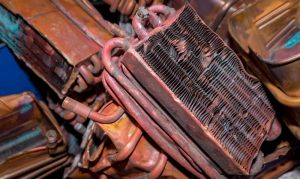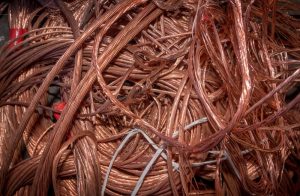Copper is one of the many minerals that we know about. But did you know it is essential to our daily lives? Copper is highly valued for its ductility, meaning it can handle physical alterations without breaking. It’s malleable with thermal and electrical conductivity. Copper is corrosion-resistant, too. This element is also considered an important nutrient in our everyday diet. With antimicrobial properties, copper can aid in preventing infection. Because of these uses and benefits, copper is one of the most consumed minerals in the world, along with aluminium and iron.
Copper (Cu) is a nonferrous metal. Australia and about half of the world produce copper for electrical applications. But it’s also useful in building construction, consumer products, transportation equipment, and industrial machinery. Let’s break it all down:
1. Electrical Applications
Copper’s electrical conductivity is parallel to other metals (except silver), which is why it is used in:
- Power generation: From motors to transformers, copper’s conductivity helps provide and deliver electricity to properties. Many new renewable sources of energy rely on copper.
- Electronics: Copper wires are found in electrical equipment. They are used in PCs, mobile phones, and TVs for circuitry, contacts, and wiring.
It’s estimated that 65% of mined copper goes to electrical applications.
2. Construction
Copper was first utilised in ancient Egypt for water pipes. Interestingly, the ones obtained are still in good condition despite having been around since 2750 BC. About 25% of copper produced goes to buildings and other crucial construction elements, such as plumbing, cladding, and roofing. That’s because the metal is light, durable, and sturdy. It doesn’t require heavy maintenance requirements but can remain aesthetically pleasing for years.
3. Transport
Copper is one of the main elements used in trains, cars, and lorries. High purity wires carry electricity from the car battery to the rest of the vehicle to reach the lights, onboard computers, navigation systems, and central locking systems.
Other Uses
Copper is also used in making coins, musical instruments, cookware, and sculptures. This metal can even be found in jewellery, doorknobs and locks, and light fixtures.
Why Copper Should Be Recycled
The demand for copper continues to grow. It’s not surprising that this daily demand will become increasingly difficult shortly. But there’s good news. Copper is extremely malleable. This flexibility allows it to be recycled infinitely without affecting its physical form and attributes. Recycling copper, without a doubt, can help meet the growing demand for this metal. It’s believed that 34% of copper produced across the world comes from recycling.
But the question is: Why should you care about recycling copper? Will it benefit you? Copper recycling is nothing new, but many Australians don’t know about it. Instead, they simply dump their electronics in dumpsites or landfills. Others keep old electronic devices in their home because they do not know what to do with them.
Recycling metals, such as copper, offers economic and environmental benefits, including the following:
- During mining and purification or refining of copper, waste gases are produced. Sulphur dioxide is among them, which can irritate the eyes and impair lung function. This gas is also harmful to the environment. Over the years, copper producers have found innovative ways to reduce the dangerous effects of sulphur dioxide, including capturing and converting it into sulphuric acid. However, recycling has little (if any) sulphur dioxide and other gases emitted.
- Another reason why recycling copper is indispensable is that it saves a lot of energy. Mining copper requires about 100 gigajoules for every tonne of this metal. On the other hand, recycling copper only takes 10% of energy or 10 GJ/tonne. That’s a huge difference. All the saved energy creates a chain reaction of positive events, including the conversation of oil, coal, or gas. Plus, it helps reduce the amount of carbon dioxide released into the atmosphere.
- There’s indeed plenty of copper resources around the world. It is believed that only 12% have been mined, so there are still a lot of resources available. South Australia’s Olympic Dam and Queensland’s Mount Isa are the country’s top copper locations. However, copper ores are a finite product. They are found in native copper and porphyry copper, among others. Because copper ores can run out, it makes sense to conserve them through recycling.
- Recycling is so much cheaper than mining and extracting new copper. It’s about 90% less expensive than taking original copper, allowing us consumers to enjoy the lower cost of copper products.
Copper refinement is toxic to the environment. Without a doubt, recycling copper is a relatively safer option that can help minimise toxins and gases released into our surroundings. Additionally, it’s vital to the local economy. It creates jobs in the recycling sector, which can involve several tasks, from collecting copper scrap to the recycling process itself.
How to Recycle Scrap Copper Wires
The reality is that recycling copper is not something we do as private individuals. It’s usually a task performed by responsible plumbing and car companies. But it does not mean that you do not have a part to play in ensuring copper gets appropriately recycled.
That’s why it is significant to check whether your electrical and electronic products go to the correct collection points. This step is not only for recycling copper but also for recovering other precious metals like gold and silver. This crucial process also segregates rare earth metals so they can be recycled and reused as components in new electronic products.
Copper and copper alloy, if not recycled, will go to openings in the ground or landfill. With the growing population comes increased waste, which means there’s a need for more holes. But landfills are being filled up more rapidly than ever. They have become scarcer, making it more expensive to dispose of any waste, including copper.
Copper is one of the many scrap metals that Collins Recycling deals with regularly. If you have any copper wires and electronic products with this metal, we can buy them from you. You not only get rid of unwanted items but you also get paid for doing so. Contact us today to schedule a pick-up at your desired location.









